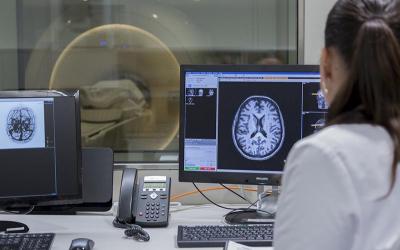Alfa + study
Alfa + is a cohort, prospective and observational study for the early identification of biomarkers of Alzheimer's disease in 500 cognitively healthy people who are descendants of patients. The cohort is made up of participants who come from the Alfa Study who, periodically, go to Barcelonaβeta Brain Research Center to perform the different tests that it contemplates.
Alfa + includes two sessions of magnetic resonance and, in addition, in an additional study, a Positron Emission Tomography (PET) of 18F-Flutemetamol and a PET of 18F-Fludeoxyglucose, which are performed in the facilities from the Hospital Clínic. In addition to these neuroimaging tests, the study includes the extraction of blood samples, cerebrospinal fluid and urine, the collection of medical records, and the performance of nursing tests (height, weight, blood pressure), cognition test and questionnaires. of life habits.
The aim of the study, funded by "la Caixa" Foundation, is to describe biological processes and identify factors that may precede the clinical phase of Alzheimer's disease. Likewise, thanks to the extensive characterization of its cohort, Alfa + aims to analyze the association between the biological, structural, functional and neurocognitive brain markers that characterize the preclinical phase of the disease and its natural history.
For more information, click on the article 'The ALFA project: A research platform to identify early pathophysiological features of Alzheimer's disease', published in Alzheimer's & Dementia: Translational Research & Clinical Interventions.










